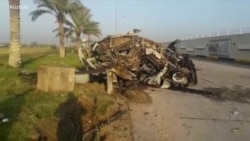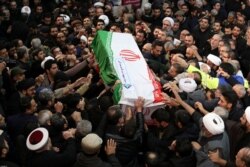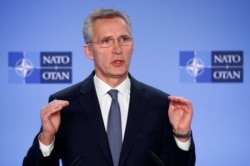LONDON — The United States' European allies have urged de-escalation on all sides following Iran's pledge to retaliate for the killing in Iraq of Iran's top general, Qassem Soleimani, who died in a U.S. drone strike close to Baghdad's airport last Friday. U.S. allies were not given warning of the attack.
British Prime Minister Boris Johnson said that his country "would not lament" Soleimani's death. The United States was not the only target of operations directed by the Iranian general, says Karen von Hippel, director-general of Britain's Royal United Services Institute.
"Qassem Soleimani has been responsible for the deaths of hundreds of American troops and other Western troops, including British troops," von Hippel said. "And he's been the mastermind, really, of every nasty plan Iran has had in the region for decades."
Britain, France and Germany issued a joint statement Monday calling on all parties to "exercise utmost restraint and responsibility." The European Union has invited Iranian Foreign Minister Javad Zarif to Brussels in a bid to defuse tensions.
"There is a mutual understanding that engagement should continue, but it is on the Iranian side to let us know how they want to proceed," European Commission spokesperson Peter Stano said Monday.
The EU hopes that the 2015 Iran nuclear deal, officially known as the Joint Comprehensive Plan of Action or JCPOA, can be saved — despite Tehran's announcement that it will now disregard the restrictions on its nuclear enrichment activities envisaged by the agreement. The United States pulled out of the deal in 2018 and reimposed sanctions on Tehran.
Atlantic Council Fellow Holly Dagres said the window for a diplomatic solution is closing fast.
"In my view, I don't think the (2015 nuclear) deal is dead until there is an escalation that leads to war," Dagres said.
Iran has pledged military retaliation, and U.S. allies fear they could also be targeted. NATO has suspended its training mission in Iraq, numbering several hundred troops — which is part of the Western coalition to defeat the Islamic State terror group.
NATO Secretary-General Jens Stoltenberg on Monday refused to be drawn into whether the organization's allies would support the United States in any conflict with Iran.
"We have recently seen an escalation by Iran including the strike on a Saudi energy facility and the shoot down of an American drone. At our meeting today, allies called for restraint and de-escalation. A new conflict would be in no one's interest," Stoltenberg told a news conference at alliance headquarters in Brussels, following an urgent meeting of NATO foreign ministers.
Russia and China condemned the killing of Soleimani. Anti-U.S. protests have spread from Iran and Iraq to Turkey, the Palestinian territories, Lebanon and Pakistan.
Israeli Prime Minister Benjamin Netanyahu praised the U.S. action Sunday, saying, "President (Donald) Trump is worthy of all appreciation for acting decisively, with strength and swiftly."
All eyes are now on Iran and whether it will heed global calls for restraint — or fulfill its pledge to exact revenge. The U.S. president has threatened to target 52 Iranian sites, some of them cultural, if Tehran retaliates against U.S. interests.







